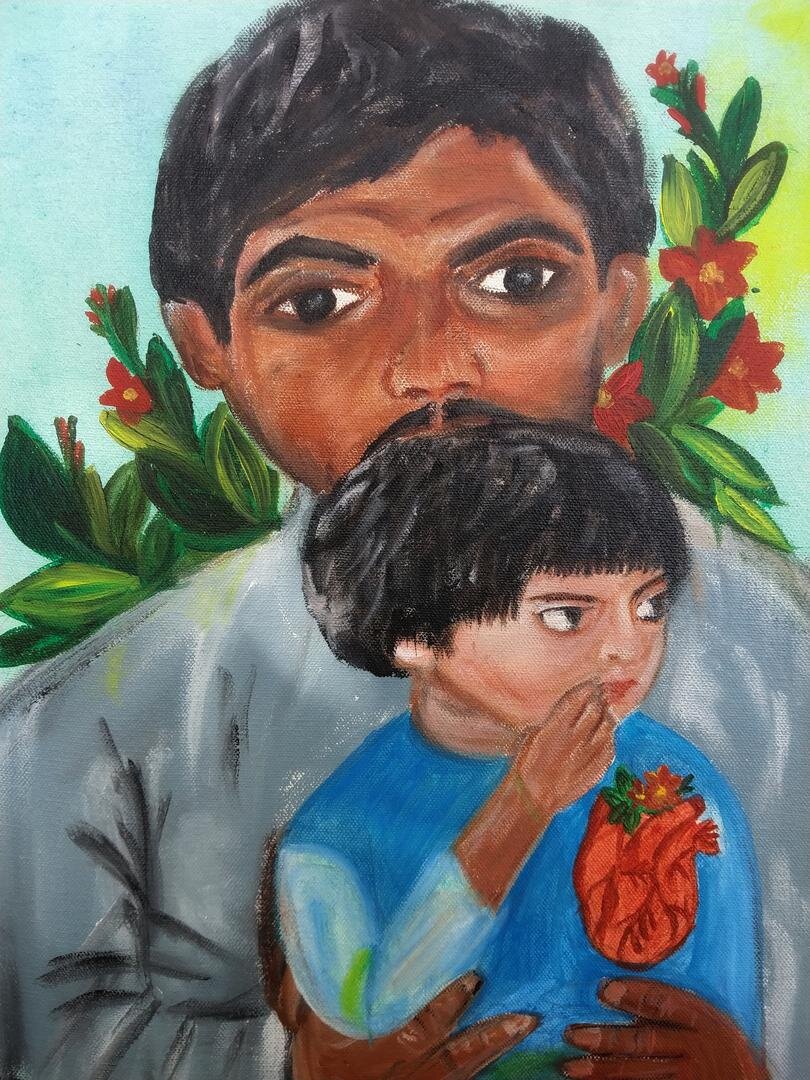Body is a Temple
My body is a temple, visited by self-entitled men. Count with me, my pilgrims:
One, Auto Anna from kindergarten who made me sit on his quicksand lap every ride to school & back.
Two, Arabic teacher who reeked of after-tea burps and rich attar of the gulf. With one hand on my leg and the other on the holy Quran.
Three, fancy salon Barber who washed my hair and felt my sprouted teen breasts until it formed stubborn hate for being born a female.
Four, a Lover who went too far, enough to leave me ice cold and in the South pole.
Five, Bangalore Bike Boys who slam on buttocks with trophy grabbing force that shudders in the palms of men.
And still counting. For the men to pierce barb wires forcing territory marking, and crushing me armless, faceless and voiceless.
My body is a temple. Of self-entitled men.
 Santhekoppa Market Town
Santhekoppa Market Town
Britishers encroached Ulliguli estate for plantation in what was originally called SantheKoppa, which literally means Market town. But the pardesis couldn’t pronounce ‘santhe’ so for their convenience they changed the towns name to Suntikoppa.
And now the town studs with laatput blond streaks call it #gingertown.
The name may have strayed but the essence of SantheKoppa persists as the assorted foundation sheltered by greying clay tiled roof stands strong. Every Sunday, men and women from the villages around bustle into this town, holding distinct market bags that look like they are clad in suspenders holding together a weeks ration and conversations.
 Children of the Bamboo Basket
Children of the Bamboo Basket
 Ele Adike Sunna
Ele Adike Sunna
Pushpa worked in a coffee plantation and chose her lover Krishna while picking ripe coffee beans in the crisp earth of the estate, that dances in the nostrils. Both in their late teenage, but he was already married and sharing betel leaf marked by each other’s sunna fingerprints was how they allowed themselves to whisper the confession of the love. The relationship wasn’t about fetishizing forbidden love instead it was Pushpas’ womanhood wanting to choose her love rather than be forced to take a husband into her prescribed responsibility as a wife. For Krishna it was the irresistible clenched-fist charm that stands out in women like Pushpa who demand beyond the prescribed, that lured him to fight for the love that she symbolized… Love and revolution.

Emotions and thoughts during the process of painting:
I existed constantly in the day that I last saw him. I walked into his hospital room, his face lit up and I sat next to him while he gripped my hand and said, ” I’m sorry I couldn’t fix this, I love you and I want you to look after yourself.” It was an unspoken understanding that it was the last time I was going to see him, tears welled up in our eyes and we let our comfort silence talk.
A week later, I get a call from him and as I pick up quickly, ” Haneen…” he whispered with a voice hiding the pain for one last time, followed by deafening silence as the cancer nodded the veins across his temple.
I lost him and I will always long for him. But In the process, I have found him in me and I hope that iam half as kind and genuine of a person as he was.
“Sorry for you loss” they say and I still don’t have a response to that. I never understood it. How about “what was he like?”, ” Do you miss him?” Because here’s my reply to that.
 Whirlpool of body and soul
Whirlpool of body and soul
Somewhere near Mandya as the car moved past a fruit vendors cart, an old remark about my body hit me, “She’s dressed like a red-light area girl” commented a relative at a picture of me wearing a crop top, slipping in a glance of the cleavage. I was at an age where my budding sexuality was horrified by that statement and I couldn’t relate the logic of showing skin to an insult of being a sex worker and why was it insulting to be labelled a worker of pleasure who is just as respectable and more to that of a fruit vendor on the street.
The Woman of Basrur or Mai Managala Suliyalli, by K. Shivaram Karanth gave me Manjula, a courtesan of a port town Basrur who walks me through the history of ‘women of pleasure’. Like the Hetaeras of the ancient Greece who were engaged in dance, music and art associated with sexual pleasure, had respect and admiration from the society. Similarly, in Basrur, it was never considered mean or ignoble to have links with any such woman. It was more a matter of pride and honour to have had the connection of any lady of Basrur. It was never just a casual ‘purchase’.
“If the body and its demands are indecent, the world itself was indecent,” says Karanth through Manjula as sex to be a natural human instinct, which shouldn’t be a matter of shame or pride. It is neither an idealized form of love nor is it divine or mean, he accepts and tells the reader to accept the reality as it is…
20 year old eyes trying to catch moments, faces and memories. And finding refuge in painting as my own untamed strokes.
A self taught artist and word-cluttered writer, Diya Haneena
Instagram: @mutthulaxmi_

